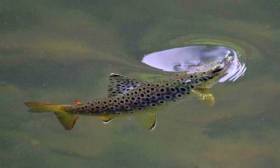Displaying items by tag: Mayfly season
#Angling - A new campaign is designed to alert anglers to renewed efforts to detect those who either take undersize trout or more trout than the rules allow.
Operation Ephemera is specifically focused on anglers fishing for trout during the annual hatch of the mayfly, and takes its name from its species name, Ephemera danica.
Mayfly season is traditionally the busiest time of year on Ireland’s prime wild brown trout limestone lakes, when fish are feeding on the surface and are ‘easier’ to catch.
The campaign will focus on Loughs Corrib, Mask, Carra, Conn, Cullen and Arrow, all in the west, and Loughs Sheelin, Owel, Ennell, Derravaragh and Ree in the Shannon catchment.
Anglers found flaunting the law will receive a fixed charge penalty notice, which attracts a fine of €150 which, if remaining unpaid after 30 days, will result in prosecution.
Compliance with other relevant angling regulations and rules, including relevant permit conditions which pertain on certain lakes, will also be enforced.
“Over recent years, we have been seeking the views of the angling public as to what they wanted IFI to do more of in terms of fisheries management in the coming years,” said Greg Forde, head of operations at Inland Fisheries Ireland.
“The theme that kept being repeated was that anglers wished to see more protection of the fisheries resource. Ultimately, there is a concern amongst anglers that not everyone on our lakes abide by the strict regulations that are in place to protect these extremely important wild brown trout and the mayfly period is when fish are most vulnerable.
“With Operation Ephemera, we are reminding anglers to familiarise themselves with the regulations pertaining to the lakes they are intending to fish and to abide by the law.
“We will also be highlighting the regulations and making leaflets available to anglers to help familiarise themselves with the rules.”
The campaign will be concentrated in May, but with hatches being late in some areas this year, this may extend into June.
It is appreciated that many anglers practice catch and release. But where trout are permitted to be retained, it is important that this is within the strict regulations for the respective lakes.
Anglers are also reminded that when fishing in a lake boat, all passengers must wear a buoyancy aid or lifejacket.
























































